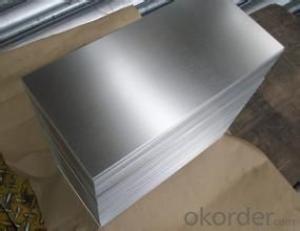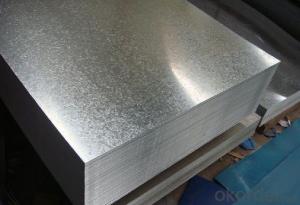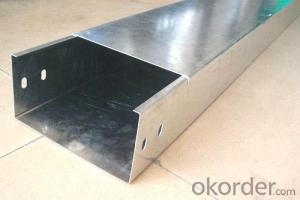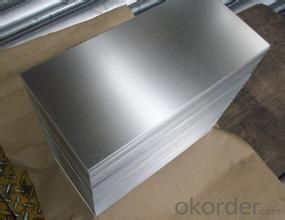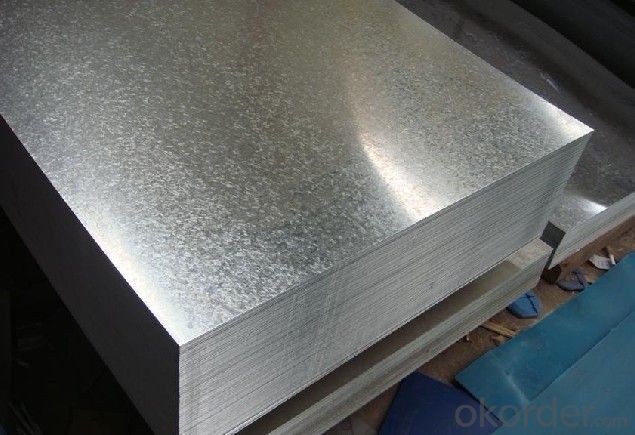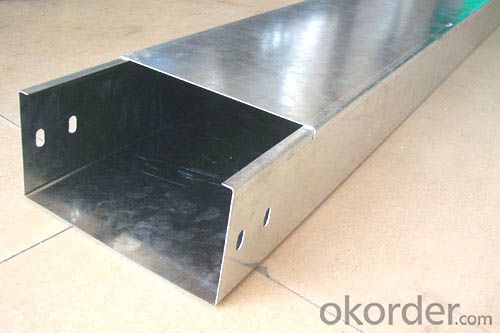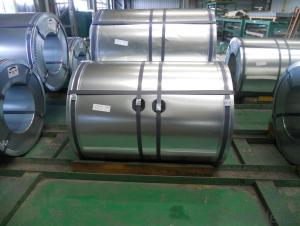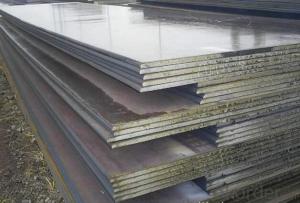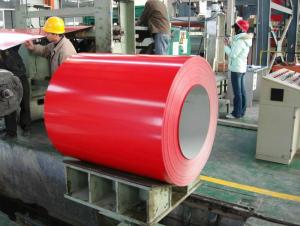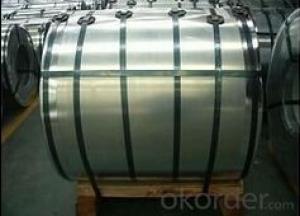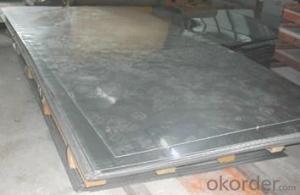GI steel sheet
- Loading Port:
- China Main Port
- Payment Terms:
- TT OR LC
- Min Order Qty:
- -
- Supply Capability:
- -
OKorder Service Pledge
Quality Product, Order Online Tracking, Timely Delivery
OKorder Financial Service
Credit Rating, Credit Services, Credit Purchasing
You Might Also Like
Specifications
GI Steel Sheet
thickness:0.135-1.5mm
width:600-1250mm
material:Q195, Q235, Q345B, SGCC, DX51D
ISO
- Q: What is the difference between a black and pickled steel sheet?
- The main difference between a black steel sheet and a pickled steel sheet lies in the surface finish and the process they undergo. A black steel sheet, also known as hot-rolled steel, is produced through a process called hot rolling. During this process, the steel is heated above its recrystallization temperature and passed through rollers to achieve the desired thickness. The resulting sheet has a dark, rough, and scaly surface, hence the term "black steel." The black surface is a result of the oxidation that occurs during the hot rolling process. On the other hand, a pickled steel sheet is produced through a process called pickling. After hot rolling, the black steel sheet undergoes a treatment where it is immersed in an acidic solution, typically hydrochloric acid or sulfuric acid. This pickling process removes the oxide scale from the surface of the black steel sheet, resulting in a smooth and clean surface. The pickling process also helps to improve the steel's corrosion resistance. The choice between a black steel sheet and a pickled steel sheet depends on the intended application. Black steel sheets are often preferred for structural components, such as beams and columns, where surface appearance is not a critical factor. Pickled steel sheets, with their smooth and clean surface, are commonly used in applications where a high-quality finish is required, such as automotive panels, appliances, and architectural elements. In summary, the key difference between a black steel sheet and a pickled steel sheet is the surface finish. The black steel sheet has a rough and scaly surface due to oxidation during hot rolling, while the pickled steel sheet has a smooth and clean surface after undergoing a pickling process to remove the oxide scale.
- Q: Are the steel sheets available in different grades?
- Different grades of steel sheets are available. Steel is categorized into various grades depending on its composition, strength, and other properties. These grades encompass carbon steel, stainless steel, alloy steel, and tool steel, among others. Each grade possesses distinct characteristics and is appropriate for different applications. The selection of a grade relies on factors such as the desired strength, resistance to corrosion, and cost-effectiveness for the particular use. Consequently, when buying steel sheets, it is crucial to take into account the grade that most effectively meets the intended purpose.
- Q: Are steel sheets suitable for elevator shafts or cabin interiors?
- Yes, steel sheets are suitable for both elevator shafts and cabin interiors. Steel is a widely used material in the construction industry due to its strength, durability, and versatility. When it comes to elevator shafts, steel sheets are commonly used for their ability to withstand heavy loads and provide structural support. They offer excellent fire resistance and can withstand extreme temperatures, making them a safe choice for elevator shafts. In terms of cabin interiors, steel sheets offer various advantages. They can be easily fabricated into different shapes and sizes, allowing for customization and flexibility in design. Steel sheets can be painted or coated to provide a smooth and aesthetically pleasing finish. They are also highly resistant to wear and tear, ensuring long-term durability in a high-traffic area like an elevator cabin. Moreover, steel sheets are known for their soundproofing properties, which is crucial for elevator cabins to provide a comfortable and quiet experience for passengers. They are also resistant to moisture and corrosion, making them suitable for elevator cabins in humid or coastal areas. Overall, steel sheets are an excellent choice for elevator shafts and cabin interiors due to their strength, durability, versatility, fire resistance, soundproofing capabilities, and resistance to moisture and corrosion.
- Q: What are the dimensions of standard steel sheets?
- The dimensions of standard steel sheets vary depending on the specific type and purpose. Generally, they come in rectangular shapes with typical dimensions ranging from 4 feet by 8 feet to 6 feet by 20 feet. However, it is important to note that custom sizes and shapes are also available to cater to different needs and requirements.
- Q: What are the reasons for the steel mesh on both sides of the back pouring belt?
- Increase overall stability. To prevent cracks due to settlement, uneven cement shrinkage, etc., but also to increase the overall firmness. Generally speaking, the stability of the post casting belt is increased.
- Q: Can steel sheets be used for clamps or fasteners?
- No, steel sheets themselves cannot be used directly as clamps or fasteners. However, steel sheets can be used to manufacture clamps or fasteners. Steel sheets can be cut, shaped, and manipulated to create various types of clamps and fasteners such as brackets, plates, or strips. These manufactured components can then be used as clamps or fasteners in different applications, providing strength, durability, and secure attachment. So while steel sheets themselves cannot function as clamps or fasteners, they can be transformed into the necessary components to serve these purposes.
- Q: Can steel sheets be used for HVAC equipment?
- Yes, steel sheets can be used for HVAC equipment. Steel is a durable and strong material that is commonly used in the construction of HVAC systems, including ductwork, air handling units, and heat exchangers. It provides excellent structural integrity and can withstand high temperatures and pressures, making it suitable for various HVAC applications.
- Q: How do I print the steel plate?
- Because in the stencil lettering all strokes forming holes, printing pigment through the hole leakage in the following paper
- Q: How are steel sheets protected during storage in humid environments?
- Steel sheets are protected during storage in humid environments by applying a protective coating, such as a layer of oil or zinc, which acts as a barrier against moisture and prevents corrosion. Additionally, proper packaging and storage techniques, such as using moisture-absorbing materials and maintaining appropriate temperature and ventilation, are employed to minimize the exposure of steel sheets to humidity.
- Q: Are steel sheets suitable for manufacturing HVAC grilles?
- HVAC grilles can be manufactured using steel sheets, which are a suitable material choice. Steel is widely favored for its strength, durability, and versatility when it comes to HVAC grilles. It possesses the capability to withstand the elevated temperatures and air pressures commonly found in HVAC systems. Steel sheets can be effortlessly molded into different shapes and sizes to meet specific grille designs and requirements. Moreover, steel is resistant to corrosion, a crucial factor in ensuring the long-lasting performance of HVAC grilles in both indoor and outdoor settings. In summary, steel sheets offer the essential properties and characteristics necessary for producing top-notch HVAC grilles.
Send your message to us
GI steel sheet
- Loading Port:
- China Main Port
- Payment Terms:
- TT OR LC
- Min Order Qty:
- -
- Supply Capability:
- -
OKorder Service Pledge
Quality Product, Order Online Tracking, Timely Delivery
OKorder Financial Service
Credit Rating, Credit Services, Credit Purchasing
Similar products
Hot products
Hot Searches
Related keywords
